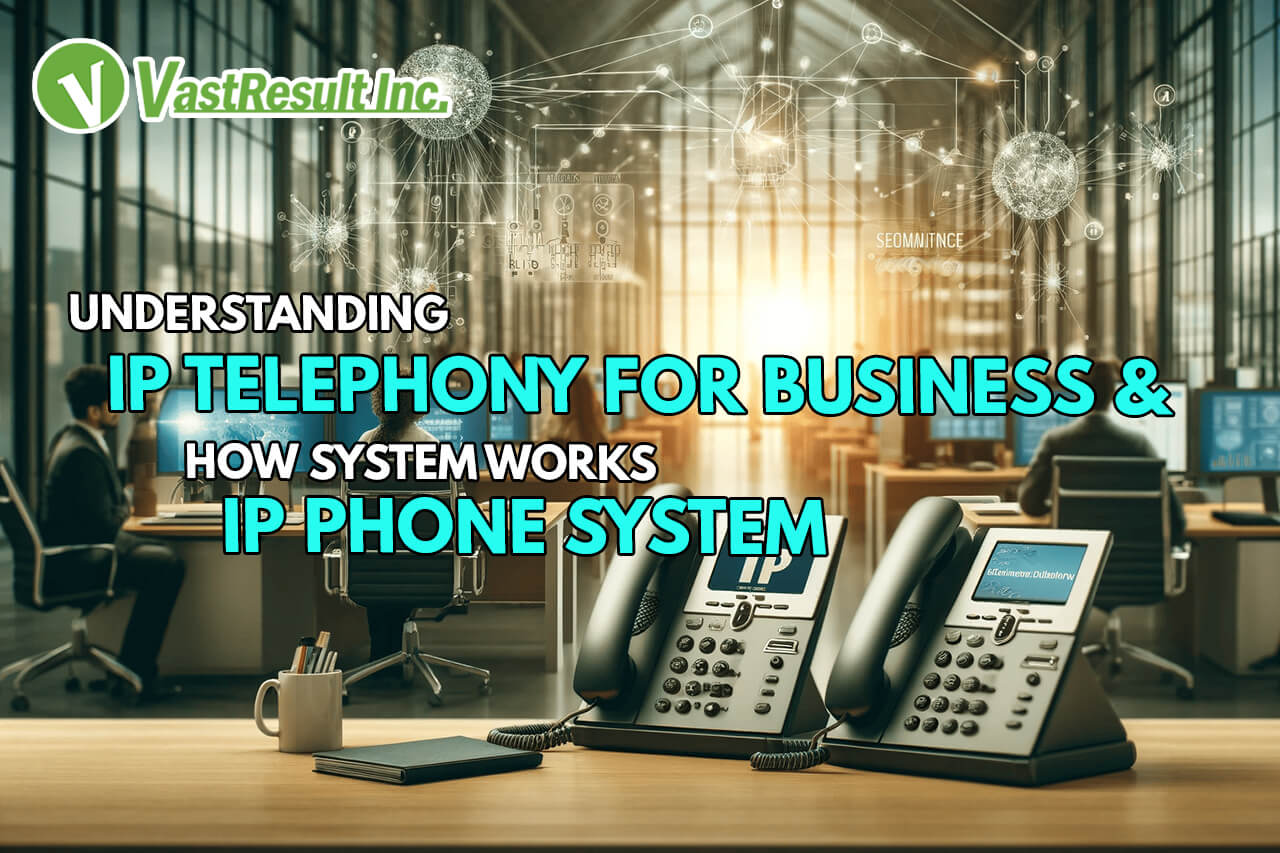
Understanding IP Telephony for Businesses & How IP Phone Systems Work
In today’s digital age, businesses are increasingly turning to voice over IP phone (VoIP) technology for their communication needs. VoIP, or voice over IP, allows you to make phone calls over the internet using a void IP phone with VoIP capabilities rather than traditional analog phone lines.
What is IP Telephony?
IP telephony refers to the technologies that use the Internet Protocol’s packet-switched connections to exchange voice, fax, and other forms of information that have traditionally been carried over the dedicated circuit-switched connections of the public switched telephone network (PSTN). At its core
What is a VoIP Phone System? (VoIP phone what is it)
A VoIP phone system is a unified communications platform that uses the internet protocol (IP) network to transmit voice and multimedia data. Unlike traditional phone over IP systems that rely on circuit-switched networks, VoIP phone systems use packet-switched IP networks to route voice conversations as digital data packets.
How Does VoIP Work?
- The VoIP telephone service converts analog voice signals into digital data packets that can be transmitted over the internet or a private IP network. At the receiving end, these packets are reassembled and converted back into audio signals for the recipient.
- Analog to Digital Conversion: When you speak into a VoIP phone or a computer’s microphone, the analog voice signal is digitized and encoded into data packets using coding/decoding schemes like G.711, G.729, or others.
- Packetization: The digitized voice data is broken down into small packets, similar to how email or web data is transmitted. Each packet contains the voice data as well as source and destination IP addresses and other routing information.
- Packet Transmission: These voice data packets are then transmitted over the IP network using protocols like the Real-time Transport Protocol (RTP) and Session Initiation Protocol (SIP). The packets may take different routes to reach their destination, unlike traditional circuit-switched networks.
- Packet Reassembly: At the receiving end, the voice data packets are reassembled in the correct order and converted back into an analog voice signal using a codec (coder-decoder).
- Quality of Service (QoS): To ensure high-quality voice communication, VoIP systems employ QoS mechanisms to prioritize voice packets over other data traffic, minimizing issues like jitter, latency, and packet loss that can degrade call quality.
Benefits of VoIP for Businesses
- Cost Savings Lower Communication Costs: VoIP helps businesses save money on domestic and international calls by using the internet instead of traditional phone lines. Less Infrastructure Needed: VoIP eliminates the need for extensive physical infrastructure, allowing businesses to use their existing internet connection for setup and maintenance.
- Scalability Simple to Expand: Scaling VoIP services as your business grows is easy. Adding lines or extensions can be done quickly and digitally, without requiring physical installations.
- Flexibility and Mobility: With VoIP services, employees can easily make and receive calls from anywhere, not limited to their office phones. This is especially useful for remote teams or professionals who are always on the go. In addition, many VoIP systems have mobile apps that enable smartphones to function as office phones, smoothly incorporating mobile devices into the company’s communication infrastructure.
- Advanced Features Rich Feature Set: VoIP services offer a wide range of features like auto-attendants, call forwarding, call queuing, conference calling, and voicemail to email transcription, all included without extra charges. Customization: Businesses can tailor these features to their specific needs, whether by integrating with CRM software or configuring complex call routing.
- Reliability and Quality Improved Call Quality: VoIP excels in voice quality when paired with a solid internet connection, surpassing traditional phone lines. Dependable: Modern VoIP systems prioritize reliability, with backup measures in place to redirect calls during outages for uninterrupted connectivity.
- Protection Advanced Protection Features: Contemporary VoIP systems come equipped with strong security measures such as encryption, secure voice and video, and network security to safeguard against interception and fraudulent activities.
- Unified Communications: IP telephone system solutions often integrate with other communication tools like video conferencing, instant messaging, and email, improving collaboration and productivity.

Types of VoIP Phone Systems
On-premises VoIP: In this setup, the voice over IP phone service hardware and software are installed and maintained on-site, giving businesses more control but requiring upfront investment and ongoing maintenance.
Hosted VoIP: With a hosted VoIP telephone systems solution, the service provider manages the phone system remotely, and businesses pay a monthly subscription fee, reducing upfront costs and maintenance responsibilities.
Virtual VoIP: Virtual VoIP phone systems are cloud-based and require no physical hardware on-site, making them highly flexible and accessible from anywhere with an internet connection.

Choosing the Right VoIP Solution (VoIP phone pricing, VoIP phone what is, phone with VoIP)
When selecting a VoIP IP phone or service, consider factors like the number of users, calling patterns, required features, and your budget. Many providers offer different pricing tiers and feature sets to accommodate businesses of all sizes.
By understanding the basics of voice over IP and evaluating your business needs, you can select the right VoIP phone system solution to improve communication, collaboration, and overall efficiency.
VoIP systems are well-suited to a variety of working environments where communication needs to be efficient, cost-effective, and versatile
Here are some of the best working environments for deploying VoIP technology
- Remote and Hybrid Workplaces
Flexibility and Connectivity: VoIP is ideal for remote and hybrid working models because it allows employees to access the business phone system from anywhere via the internet. This supports a mobile workforce while maintaining seamless communication channels.
- Technology Startups and Tech Companies
Scalability and Integration: Startups and technology companies benefit from VoIP’s ability to integrate with software and scalability, making it easier to add features or expand as the company grows.
- Call Centers
High Call Volume Management: VoIP systems are essential in call centers due to their ability to handle high volumes of calls and provide tools like automatic call distribution, call queuing, and interactive voice responses
Schematic Diagram

- Corporate Offices
Cost-Effective Communication: Larger corporations with multiple departments or global offices can reduce communication costs significantly by using VoIP across all locations, facilitating easy transfers and conference calls without the high costs associated with traditional phone systems.
- Customer Service Operations
Enhanced Features: Businesses that operate in customer service can utilize VoIP’s advanced features like call forwarding, voicemail to email, and call recording to enhance customer interactions and service quality.
- Educational Institutions
Campus-wide Communication: Schools, colleges, and universities can use VoIP to connect various buildings and facilities across large campuses, providing a unified communication system that is easy to manage and update.
- Healthcare Facilities
Reliable Communication Needs: Hospitals and clinics benefit from VoIP’s reliability and the ability to prioritize emergency calls. Additionally, VoIP can integrate with healthcare databases and scheduling systems to improve patient communications.
- Hospitality Industry
Guest Services: Hotels and resorts use VoIP to enhance guest services with features like direct room calling, voice mail, and billing integration, providing a better experience for guests.
Schematic diagram

- Retail Businesses
Store Communications: Retail stores utilize VoIP to manage communications between different store locations and the central office, streamlining operations and improving coordination for inventory management and customer service.
- Manufacturing Sector
Plant Communication: Manufacturing plants often cover large areas where traditional phone systems are costly to implement. VoIP provides a cost-effective solution that can cover extensive areas without the need for extensive wiring.
VoIP’s flexibility, cost savings, and feature-rich offerings make it a highly effective solution across these diverse environments, enhancing communication capabilities and supporting various operational needs.
IP Telephony and IP Phones offer flexible communication solutions that can be adapted to a wide range of environments beyond the typical office settings
Here are additional environments where these technologies can be highly beneficial
- Construction Sites
Mobile IP Phones: Robust IP phones with wireless capabilities are ideal for construction sites, allowing staff to communicate across large, often noisy areas without the need for fixed lines.
- Transportation and Logistics
Dispatch Centers: IP Telephony can integrate with GPS and other tracking systems to improve the coordination of logistics operations, facilitating real-time communication between drivers and dispatchers.
- Real Estate
Field Agents: Real estate agents who are often on the move can benefit from IP Telephony’s mobile solutions, allowing them to manage calls and access CRM systems from their smartphones.
- Event Management
Event Sites: Large-scale events can use IP Telephony for temporary setups, providing scalable communication networks that are crucial for coordinating staff and emergency services.
- Law Firms
Confidential Communications: IP Telephony can offer enhanced security features like call encryption, crucial for industries where confidentiality is paramount.
- Financial Institutions
Bank Branches: Banks can use IP Telephony to integrate voice services with their customer service platforms, enhancing customer interaction and support.
- Media and Entertainment
Broadcast Studios: IP Telephony can be integrated into broadcast systems, facilitating smooth operations behind the scenes and during live broadcasts.
- Government Emergency Services
Emergency Call Centers: IP systems can be critical in emergency services operations, where reliability and the ability to quickly reroute calls during crises are paramount.
- Technology and IT Companies
Tech Support Centers: These businesses can utilize advanced IP Telephony features to manage tech support calls efficiently, including integration with ticketing systems.
- Tourism and Travel Agencies
Travel Agencies: IP Telephony allows travel agents to communicate with clients and partners worldwide easily and cost-effectively.
- Architectural and Engineering Firms
Collaborative Work: These firms can benefit from the conferencing and file-sharing capabilities of IP Telephony to facilitate collaboration across multiple locations.
IP Telephony is valued in these diverse environments for its flexibility, scalability, and the wide array of features it offers, making it a cornerstone technology for modern communication needs.
Advantages of Using IP Phone Systems
- Cost-Effective: They eliminate the need for separate voice and data networks, reducing costs.
- High-Quality Audio: Modern IP phone systems provide clear voice quality, often better than traditional phones.
- Flexibility: Users can make and receive calls from anywhere with an internet connection.
- Advanced Features: Features like voicemail-to-email, auto-attendant, and video conferencing are readily available.
IP phone systems represent a significant advancement in communication technology, offering businesses a more efficient, cost-effective, and feature-rich alternative to traditional telephony. They are particularly beneficial for businesses with remote workers or those that require advanced communication features.

Why Choose us VastResult
as your IP telephony and IP phone provider means choosing a reliable, secure, and innovative partner who will propel your business communications forward. Join us, and discover how our commitment to excellence and focused service can transform your communication capabilities.
